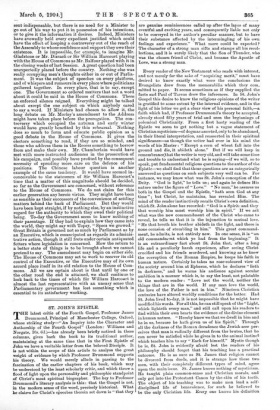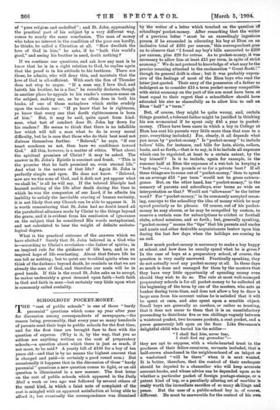rrHE latest critic of the Fourth Gospel, Professor James Drummond,
Principal of Manchester College, Oxford, whose striking study—" An Inquiry into the Character and Authorship of the Fourth Gospel" (London : Williams and Norgate, 10s. 6d.)—has already been briefly noticed in these columns, gives back the book to its traditional author, maintaining at the same time that in the First Epistle of .John we have a veritable letter from the beloved Disciple. It is not within the scope of this article to analyse the great weight of evidence by which Professor Drummond supports his theory. We would merely allude in passing to the fascination of the earlier chapters of his book, which may be understood by the least scholarly critic, and which throw a flood of light upon the personality and philosophic standpoint of Christ's most spiritual biographer. The key to Professor Drammond's literary analysis is this: that the Gospel is not, in the modern sense of the word, precisely historical. What he claims for Christ's sixeches therein set down is "that they are genuine reminiscences called up after the lapse of many eventful and exciting years, and consequently liable not only to be conveyed in the author's peculiar manner, but to have their substance affected by the intermingling of his own feelings and experience." What more could be expected? The character of a strong man sifts and stamps all his recol- lections, and it is surely likely that the Son of Thunder, who was the chosen friend of Christ, and became the Apostle of Love, was a strong man.
Every reader of the New Testament who reads with interest, and not merely for the sake of "acquiring merit," must have desired to know exactly what were the conclusions the Evangelists drew from the memorabilia which they corn_ mitted to paper. It seems sometimes as if they supplied the facts and Paul of Tarsus drew the inferences. In St. John's Gospel this desire to know the religious opinions of the writer is gratified to some extent by the internal evidence, and in the light of his letter we get a clear view of his personal faith,—a faith which had, if Professor Drummond's theory be accepted, already stood fifty years of trial and seen the beginnings of polemical Christianity. From a first hasty reading of the Epistle we seem to get nothing but a vague statement of Christian mysticism—of dogmas asserted, only to be abandoned, in their literal interpretation, and reasserted in their spiritual significance—as though the writer had ever in his mind the words of his Master : "Except a corn of wheat fall into the ground and die, it abideth alone." But if we will keep in remembrance:that the writer is very old, and will take some time and trouble to understand what he is saying—if we will, so to speak, put fundamental religious questions to the author of the Epistle—we shall find that those questions are as categorically answered as questions on such subjects very well can be. For instance, we may know what was St. John's conception of the Deity. "God is light," he tells us ; and again he defines His nature under the figure of "Love." "No man," he assures us both in the Gospel and the Epistle, " hath seen God at any time " ; but Christ, he maintains, has revealed Him. The mind of the reader instinctively recalls Christ's own definition, which St. John alone has recorded : "God is a Spirit: and they that worship him must worship him in spirit." If we ask what was the new commandment of the Christ who came to reveal, he tells us that it is the injunction to mutual love. "He that loveth his brother abideth in the light, and there is none occasion of stumbling in him." This great command- ment, he admits, is not entirely new. In one sense, it is "an old commandment which ye had from the beginning." It is an extraordinary fact about St. John that, after a long life and a peculiarly harsh experience, after seeing Christ crucified and his friends murdered, and knowing as he knew the corruption of the Roman Empire, he keeps his faith in human nature. Certainly he takes no rose-coloured view of the society around him at Ephesus, which he declares " lieth in darkness," and he warns his audience against secular ambition in a manner which is, to say the least, not palatable to the modern reader : "Love not the world, neither the things that are in the world. If any man love the world, the love of the Father is not in him." Nineteen Christian centuries have altered worldly conditions for the better. Had St. John lived to-day, it is not impossible that he might have modified his words. For all this, he can still speak of the "Light, which lighteth every man," and still call upon his readers to find within their own hearts the evidence of the divine element in human nature. "Hereby know we that we dwell in him and he in us, because he hath given us of his Spirit." Through all the darkness of the Roman decadence the Jewish seer per- ceives that man is radically different from the brutes, that he can never be satisfied while he gives in to the animal instinct which teaches him to say "Each for himself." Mystic though he is, St. John is evidently afraid lest the readers of his philosophy should forget that his teaching has a practical outcome. He is as sure as St. James that religion cannot be divorced from deeds, and it is strange how these two men, with their completely different types of mind, agree upon the main issue. St. James knows nothing of mysticism. He taught plain common-sense and Christian morals, and only got into the Protestant Canon by the skin of his teeth. The object of his teaching was to make men lead a self- disciplined life of benevolence, for such he believed to be the only Christian life. Every one knows his definition of "pure religion and undefiled" ; and St. John, approaching the practical part of his subject by a very different way, comes to nearly the same conclusion. The man of money who takes no interest in the condition of the Poor can hardly, he thinks, be called a Christian at all. "How dwelleth the love of God in him," he asks, if he "bath this world's good," and seeing his brother in need, doeth nothing P
If we continue our questions, and ask how any man is to know that he is in a right relation to God, he replies again that the proof is in his attitude to his brethren. There are those, be admits, who will deny this, and maintain that the love of God is all-sufficient. With such the Son of Thunder does not stop to argue. "If a man say, I love God, and bateth his brother, he is a liar," he roundly declares, though in another place he appeals to his reader's common-sense on the subject, making use, as he so often does in both his books, of one of those metaphors which strike crudely upon the modern ear : "If ye know that he is righteous, ye know that every one that doeth righteousness is born of him." But, it may be said, quite apart from kind- ness, what test of conduct does St.. John lay down for his readers ? He seems to think that there is no infallible law which will tell a man what to do in every moral difficulty, but he is sure that those who do their best need not distress themselves further. "Beloved," he says, "if our heart condemn us not, then have we confidence toward God." All this, however, is a matter of ethics. What about the spiritual promises of Christ ? it may be asked. The answer in St. John's Epistle is succinct and frank. "This is the promise that he bath promised us, even eternal life." And what is the nature of that life ? Again St. John is perfectly simple and open. He does not know. "Beloved, now are we the sons of God, and it doth not yet appear what we shall be," is all he will say. If the beloved Disciple had learned nothing of the life after death during the time in which he was the companion of our Lord, if he admits his inability to satisfy the inevitable craving of human cmiosity, it is not likely that any Church can be able to appease it. It is worth remembering that St. John had no doubt heard all the parabolical allusions made by Christ to the things beyond the grave, and it is evident from his confession of ignorance on the subject that he considered His words metaphorical, and not calculated to bear the weight of definite eschato- logical dogma.
What is the practical outcome of the answers which we have elicited ? Surely that St. John believed in a God who is—according to Christ's revelation—the father of spirits; in an inspired rule for the guidance of life here, and in an inspired hope of life everlasting. About that future life he can tell us nothiug ; but to quiet our troubled spirits when we think of the darkness beyond death, he reminds us that we are already the sons of God, and therefore our souls will be in good hands. If this is the creed St. John asks us to accept, he makes undeniably a great demand upon faith—both faith in God and faith in man—but certainly very little upon what is commonly called credulity.











































 Previous page
Previous page